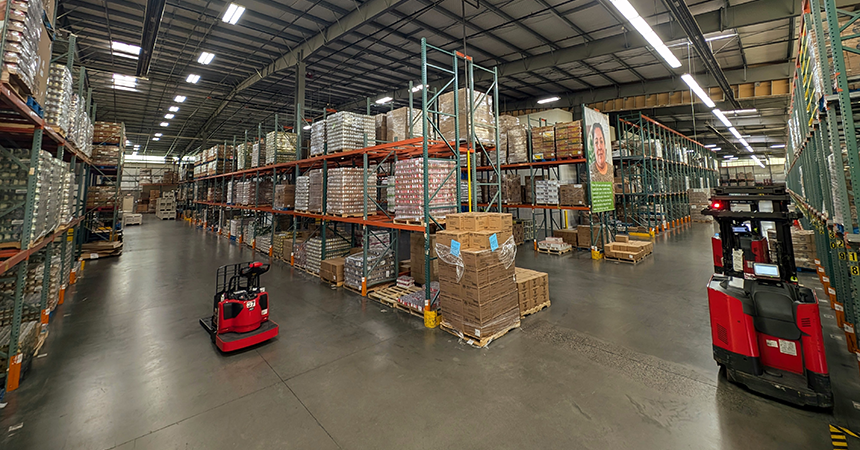The Oregon Food Bank headquarters in Portland distributes around a million pounds of food weekly to 21 regional food banks. This effort relies on a workforce that works from 5 am to 10 pm and uses equipment that often runs for up to 16 hours a day. While this is necessary to complete the Oregon Food Bank’s impactful work, it leads to wear and tear on the equipment, which can become financially burdensome.
“We’re really looking for ways to improve our operations and also get energy savings,” said Kira Harrow, Oregon Food Bank facilities manager.
For several months, Harrow had been eager to replace the food bank’s aging forklift battery chargers- which are essential for powering equipment that moves thousands of pounds of food around the facility. Unfortunately, the chargers were falling short: inefficient, noisy and painfully slow to recharge. While Harrow recognized the clear benefits of upgrading, from energy savings to operational improvements, budget constraints made it challenging to advocate for the much-needed upgrades.
During a conversation with Motive Energy, the facility’s battery vendor, the vendor mentioned that new forklift battery chargers might qualify for cash incentives from Energy Trust. Intrigued, Harrow explored the Energy Trust website, confirming that the project would qualify for cash incentives making the new chargers more affordable.
“When we came across this opportunity and realized that this incentive would basically cover these new chargers, it’s like, yeah let’s go for it. We started moving on that right away,” said Harrow.
Working with the battery vendor, the Oregon Food Bank selected eligible chargers that would not only reduce energy consumption and associated utility costs but also extend the lifespan of their existing forklift batteries. Harrow particularly values the latter benefit, noting that new batteries can cost as much as $10,000, making it essential to maximize their longevity.
After purchasing the new chargers and applying for incentives, Oregon Food Bank received a $24,000 cash incentive, completely covering the cost of the new chargers. Harrow appreciated the simplicity of it all, noting that she was “really surprised by just how easy the process was for us to make such a big improvement on our charging infrastructure at virtually no cost to our organization.”
This project was quick and impactful, with significant benefits. The new chargers will save the organization an estimated $4,000 in annual energy costs, reduce operating expenses and extend the life of existing forklift batteries. Forklift operators also noticed the improvement, appreciating that the chargers aren’t as loud or worn out as the old ones.
Prioritizing cost benefits and energy savings while minimizing wear and tear is how Harrow makes the most of the Oregon Food Bank’s budget.
Harrow recommends that any business owner struggling to replace aging, inefficient equipment consider Energy Trust cash incentives. “This program specifically was really easy and straightforward,” said Harrow.
Learn more about cash incentives for upgrading your facility by visiting our service shops and warehouse incentives page. For questions or assistance with your incentive application, email our team at existingbuildings@energytrust.org.

